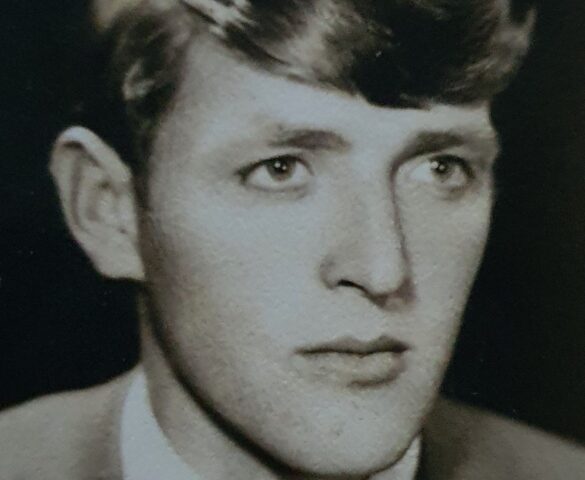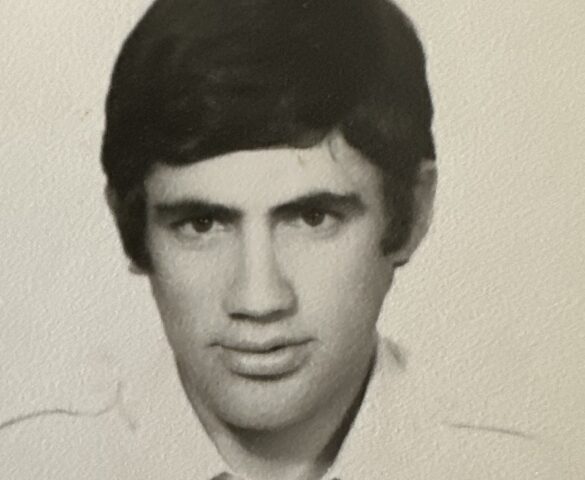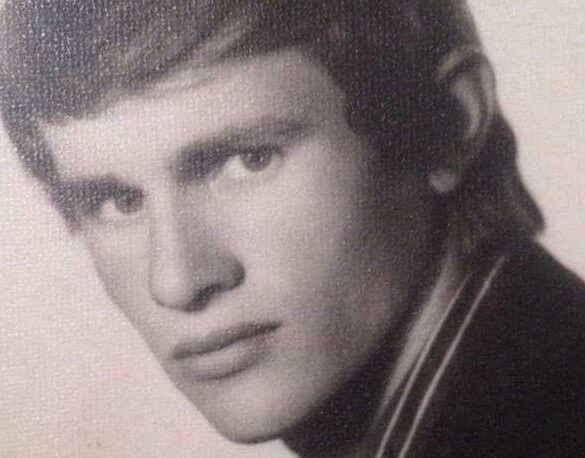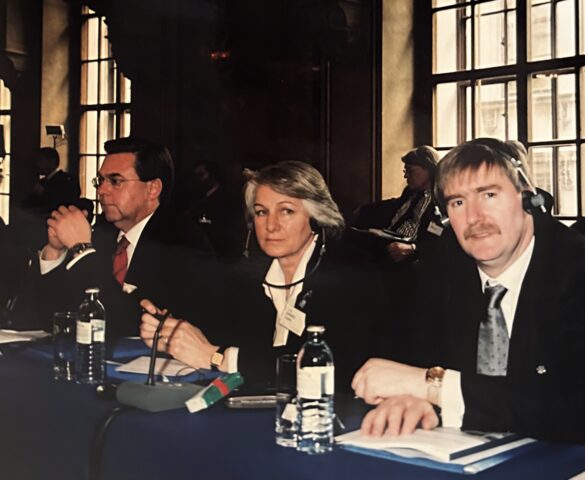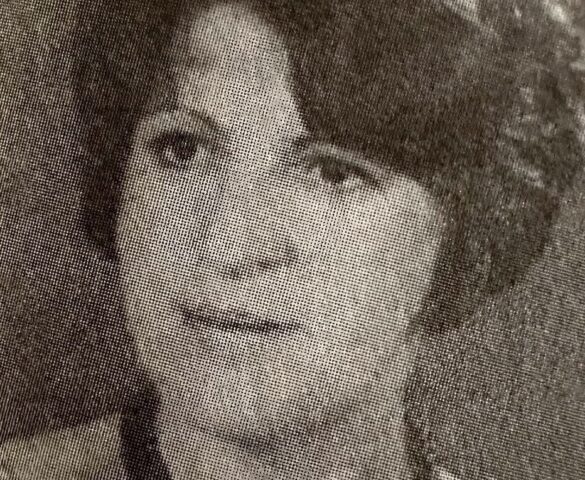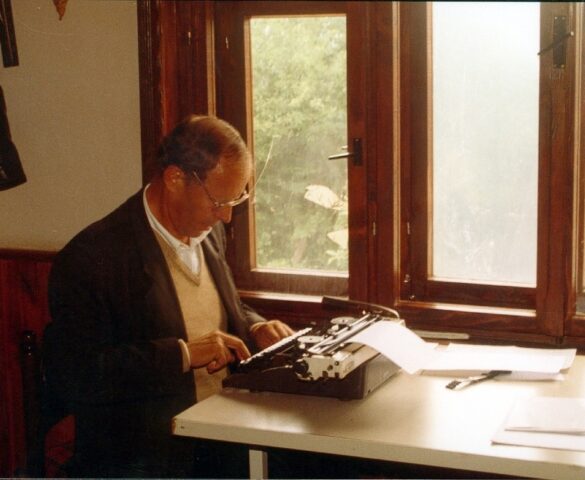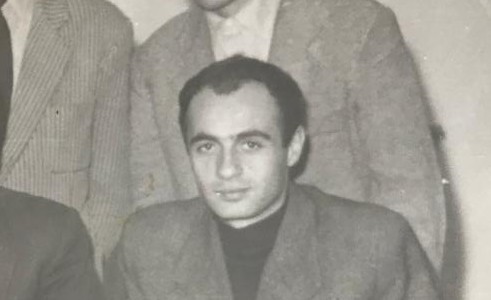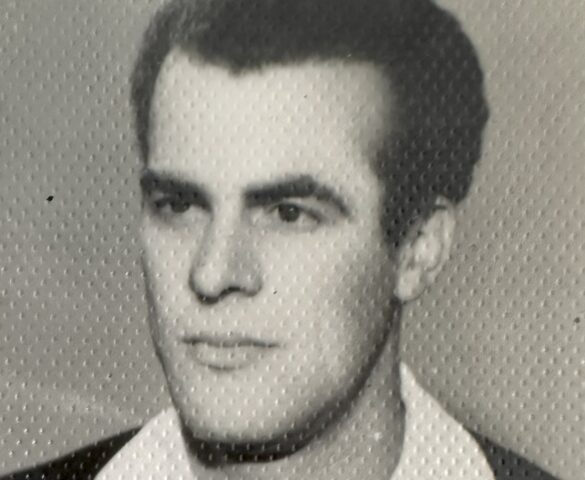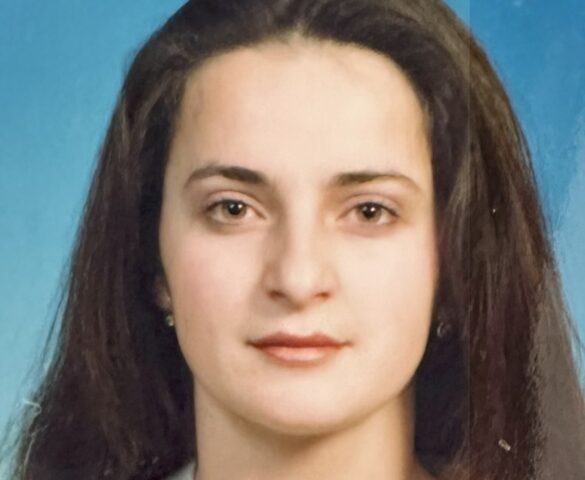On the way to the Rambouillet Peace Conference: […] They had never given me a passport since I got out of prison. Then, in a way, they were forced to, since I was a member of the delegation, they issued me a passport. With that brand-new passport, I was traveling freely for the first time that day. […] The members of the KLA in the delegation came to the airport but didn’t go through the usual checkpoint where passports are inspected, they went straight onto the plane. They arrived in KDOM vehicles, as they were called at the time, the observers. They boarded the plane without any checks at all. Even so, they didn’t fully trust that things would go so smoothly. Each of them had taken a pistol along. Not to kill anyone with it, but they were convinced they must not surrender and would use it on themselves if it came to that. […] On the plane I said to the Commander of the General Staff, Azem Syla was in that position at the time, we had been organized together in the movement and later we were in prison together for a while. […] Jokingly, I said, ‘When Isa Boletini went to Europe, he didn’t go unarmed like you, like this,’ I told him. And he opened his coat like this and showed me that he had one.
The former political prisoners in Kosovo during the Yugoslav period were mostly charged for irredentist and nationalist activities, and considered internal enemies of Yugoslavia. They were identified as Ilegalja, a blanket term for the underground groups organised in threes. The movement still remains obscure due to their form of activism that acted in secret. The political legacy of Ilegalja is discussed within different historical contexts. Contradicting narratives about this movement calls for new ways of mediating this difficult-to-approach heritage.
Mehmet Hajrizi
Political activistSahit Berisha
Political activist[Shkolla Normale, November 30, 1968]. When Xhavit Nimani took the floor… it was already very late, almost 8 in the evening…I got angry and spoke arrogantly, I said, ‘Enough, do not tire us.’ …For this day, for this speech, I had prepared myself. I had memorized some things by heart. Ali Boletini taught them to me, as did Hamëz Shala and Halil Alidema. They made me repeat the words. ‘Ask for the flag. Because the partisans fought in the anti fascist war with this flag, ask for it. Ask for the development of the country. Ask why Trepça is being exploited.’ …And Ali never spoke loudly, he said, ‘Do not be like Halil who bangs on the table, you do not bang on the table. If you are there, you must present the demands.’.. Point by point, like reciting a poem, I mentioned all of those things… After I finished with my final sentence, I said, ‘Comrade Xhavit, it is useless to keep us. Until those in prison are released we have no intention to end the strike, the boycott of lessons.’ …On December 4, they were released. That was our victory. But the possibility to speak, to say things, to demand, was greater…an inspiration that it was indeed possible to make even political figures like Xhavit Nimani back down.
Agim Paçarizi
Political activistThere was a group of students from Podujeva who, it was said, had disarmed a police patrol. They were brought to [the prison in] Lipjan… One day, we saw that those students were also being brought out to walk. There was Jetish Rekaliu, who had been a teacher to some of the students who were now walking through the yard. We, from behind the prison bars and windows, started calling out to them by name, giving them moral support. Some of the students smiled back, some might’ve said something, I couldn’t hear it. Then one of the guards, an Albanian, lined [the other guards] up and said, ‘I’m going to give each of you a stick.’ He handed them each a baton. The teachers’ reaction, especially Jetish [Rekaliu]’s, was furious. He grabbed the prison bars and shouted at the guard: ‘You idiot! You lowlife! How dare you beat children in front of us?’
Lirije Osmani
LawyerIn the seventh grade, after the expulsion of Albanians to Turkey began…I had a deskmate, Nazmije, I don’t remember her last name. When the letter came that she absolutely had to go to Turkey, it was an extremely heavy event which left such an impression that I will never forget it. Every time I remember it, somehow I get very emotional. All the people of Mitrovica would go out to the train station. It was the Belgrade–Skopje train. Because there had also been an agreement with Skopje, that they should go to Skopje where they were given some kind of papers, permits called vesika. Then Turkey accepted them and… that atmosphere was so heavy, that all the people cried. Those who were leaving cried, their relatives cried, the people cried. No one knew what kind of fate was awaiting them…That experience with that classmate was very hard… We went to the train to see them off, the crying and screaming went on. It was very sad. I don’t have any nostalgia for Turkey because our people suffered. They never opened schools, they didn’t let them speak the language…
Remzije Limani Januzi
Political activistThe demands were mainly political. ‘Self-determination!’ ‘Free the political prisoners, Adem Demaçi, Rexhep Mala!’ We called all the political prisoners by name, ‘Trepça works, Belgrade prospers!’ ‘Kosovo Republic!’… ‘Constitution, either through peace or war! […] Hydajet spoke, he spoke as a worker, with his hat on, he was wearing simple clothes, he was a worker and we didn’t know him at all. And that day, Teuta… that situation didn’t let you be passive. And I said, ‘Teuta, you climb up, climb up as a woman. Why should only men climb up? Let the women climb up too.’ ‘No, you climb up Remzije.’ I don’t know how it happened. ‘You climb up, you climb up!’ Before I did, my brother wrote those demands, what to say… on someone’s back, I think it was Teuta’s brother. And he gave me those notes and I was wearing a skirt, it wasn’t exactly easy for me, and then Hydajet Hyseni asked me, ‘Do you recognize me?’ […] And I called the slogans and the crowd was even louder because it’s a little different when a woman speaks. I came down and continued rallying until the evening, it was dark, very dark, it was late. They dispersed us with tear gas, we scattered and didn’t see each other anymore. I lost my shoes and I saw a guy running down the street, I don’t remember what street that was. And he gave me one of his shoes… I kept it until recently. I don’t know whether someone threw it out recently, because I wanted to keep it as a memory, a memory to keep in a museum — that shoe, to tell about where it happened, what they did, what we did at that time.
Hanëmshahe Ilazi
Political activistI was four years old when my mother passed away. And this is… I’ve written a book Rrënjët e familjes (The Roots of the Family), where my grandfather is the main character. I suspect that a Serbian activist killed my mother. My mother was killed. I only remember the blood {touches her stomach}, a pillow, because they would remove us from the room. My father quickly rode a horse to the city and brought a doctor. […] I suspect she was killed, they threw a bomb into the chimney, at the fireplace where they used to cook. […] And when they came to take our wheat and corn, this Serbian woman entered the granary, and they took the wheat, but also the granary and the corn. And my mother grabbed an axe and, standing at the granary door with the axe, said, ‘As long as I’m alive, you’ll never leave here alive, because you’ve already taken the flour and the wheat, and now you want the corn too, leaving my children without bread.’ She [the Serbian woman] got very scared and told my father, ‘Take your wife away from here, I give you my word that I won’t take a single grain of corn.’ And my father somehow signaled my mother, as he later told me, and said, ‘Go, go to the house because the children are crying, or the bread might be burning.’ As soon as she left, the Serbian woman came out and ran away. However, she knew the entire layout of our house. And I believe that… because in ‘50 my mother was killed. She [the Serbian woman] threw a bomb, as my mother and the stepmother were there. The stepmother was slightly injured, but my mother was severely injured and died because of it.
Ahmet Qeriqi
Political activistOn March 27, 1999, at eight in the morning, two Yugoslav military planes struck the neighborhood where we were sheltering with eight cluster bombs, resulting in the martyrdom of a 16-year-old boy and injuries to eight others. On the same day, at 12:00 PM, Serbian media reported the destruction of the Radio Kosova e Lirë broadcasting base, while we aired our program at 4:00 PM, the scheduled time for broadcasting throughout the war. At that time, the Serbian war criminal [Vojislav] Šešelj and several Yugoslav army commanders stated in the media that they would soon have their morning coffee in Berisha, where they also planned to build a football stadium.
In order to survive under conditions of continuous attack, at the beginning of April 1999, we built a well-fortified bunker on a mountain peak, and from the bunker, we broadcasted the daily program, up to 1 hour and 30 minutes per day, during the last three months of the war. The area near the bunker was hit numerous times by enemy fire but was not destroyed.
Agim Gjakova
Political activistThat shaping of ours, and especially since I might have been the kind of guy we call bold, more advanced, or however you want to put it. […] The idea came to me to establish the Association of Albanian Students in Belgrade.
This wasn’t simply a cultural-literary association. It was, in a legal sense, an organization through which we would then carry out our underground activities. But we needed this legal aspect of the organization as a shield, not the underground one. You might say that I thought it through well. At first, I discussed it with the most loyal and devoted friends. They agreed. They accepted the idea of establishing it. A meeting was held, it was during a literary session. I stood up and presented the concept, the idea, and the proposal to create the association. It was approved by everyone.
To avoid it seeming like we were just a group, we formalized it on paper and had everyone sign their agreement for the establishment of the association. Additionally, Setki Imami was there, an experienced worker in Belgrade. I’m not sure if Anton Çetta was there, I don’t quite remember. Dančetović, who was the head of the department, did not sign it.
Fehmi Elmazi
Political activistI was beaten in the Niš Prison, they crushed me, they trampled on me. It wasn’t just that they beat me, there were three supervisors. I was sentenced by [Aleksandar] Ranković because I didn’t stay quiet, even in prison, do you understand? Three of them trampled on me, and I spent months recovering, do you understand? In isolation for 14 months with 200 grams of bread. From 72 kilos, I dropped to 32 kilos. What more can I tell you? A greater punishment… there was no cell light, nothing, no window, no threshold. I could never sleep because in Niš the wind blows, and the Niš Prison is in a place where the wind hits from all sides.
[…] My father came to see me. My father was elderly, as I told you, 89 years old. He came to see me. When he saw me at 30 kilos, he almost walked into the path of an oncoming bus. But I had a cousin who was the conductor, and he recognized him and stopped the bus.
Majlinda Sinani Lulaj
Political activistDuring that period, it was more difficult to go… also due to the nature of the play. It wasn’t like we staged it in a cultural hall because it was a performance that, in a way, was unacceptable to the regime of that time. However, we performed it in, let’s say, halls, in schools that were improvised. In the physical education hall, if there was one. They were somewhat larger halls, if I can say so, or, for instance, when we were invited to villages, all over Kosovo, not just in Drenas.
It happened that we performed even on tractor trailers that had been set up and improvised in schoolyards for their performances, and we used them. Or in school corridors, where they were longer, desks were set up, and on top of the desks, so to speak, the play was performed by us, the actors, while the audience sat on seats, chairs, desks, or even stood. Children, teachers, and often even villagers from the surrounding houses would come to see a performance in Albanian.
